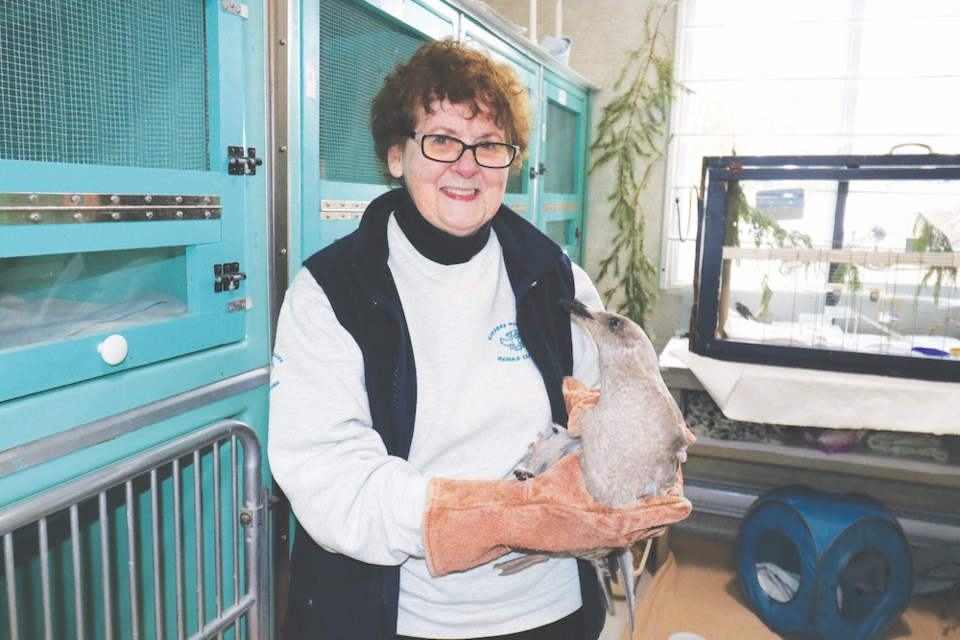How do you measure 34 years? For Irene Davy, it’s nearly 11,000 animals treated at the Gibsons Wildlife Rehabilitation Centre.
Now, at the end of April, Irene is stepping back from the rescue facility that she founded with her late husband, Clint Davy, in 1988.
An ad posted last week seeks to fill the role of certified wildlife rehabilitator to oversee the care of animals and general operation of the centre. Whoever steps into Irene’s shoes needs to be certified as there’s a lot to know about caring for wildlife, Irene stressed. Irene also manages the staff, volunteers, the public and paperwork for every single animal treated and lets the various regulating authorities know what happened to them (for example: care of migratory birds is regulated federally, while birds of prey and certain mammals are provincial).
Ideally, the centre would also move from the 1.6 acre property just outside of Gibsons to a five-acre property somewhere on the Coast. “It’s just too small,” says Irene. “[Animals] get the best care that we can give them, but we need to be bigger – after 34 years, there's a lot more people on the Coast, so there’s more critters coming in.”
While Irene dreams of a day where people won’t be coming into her yard, she said, “Clint and I spent our life getting this far, so I don't want to just close it down.”
“Before we had a trailer, one of our bedrooms was converted into a bird room. And that's where the people came,” explained Irene. Until three or four years ago, the centre was entirely volunteer run (sometimes answering dozens of calls a day). Now there is staff, but only part-time.
The centre encompassed the couple’s lives. “Because one had always to be here, we never got to go on holiday together, ever.”
Then, in January 2020, Clint died.
“Clint, he was excellent,” said Irene. “Even the vets preferred him to do splinting and things because most vets are not used to dealing with birds.”
When the pandemic hampered volunteer participation, the Coast was also faced with a shortage of veterinarians.
“I always regarded Clint as the doctor, I was the nurse,” said Irene. “He was really excellent at doing anything with the animals. I'm OK. But I would let him do it because he was better.
“And then all of a sudden, I had to do it and I had to try and show people how to do it.
“Sometimes it worked. Sometimes it didn't. And all the time you have a life at stake.”
It’s not just birds they’ve cared for over the years, but also raccoons, squirrels, fawns, a bobcat (“they are scary wild”), bear cubs (“they try to be brave but they’re not really”), seals (“they go in the bathtub”).
One memorable rescue was for an elephant seal pup near the Lighthouse Pub in Sechelt a few years ago. “Apparently they are quite susceptible to the sun and its skin was beginning to peel,” explained Irene. “So we decided it had to come home with us.”
At birth, elephant seal pups weigh about 70 lbs. and grow to be anywhere from 900 to 5,000 lbs. To get the already large animal from the beach, Clint walked into the pub and recruited three patrons. “They rolled it into a tarp and then they carried it like a stretcher to our van,” remembered Irene. Once back at the centre, they parked the van on a slope and hooked up a hose to spray the pup until they could get it to a marine rescue centre on the mainland. Rodney, as he was called, made the TV news before getting released.
“There's a lot of fun things that happen, it's not doom and gloom,” said Irene. “And of course, releasing anything that’s come in that’s been injured or you've cared for or you’ve raised it, you get a lot of satisfaction.”
However, the burden of caring for the injured critters of the Coast? “It's too much for one person.”
Together, the staff, the volunteers and the board are to carry on the centre with the help of a new recruit. And for Irene, perhaps the phone will ring a little less.





